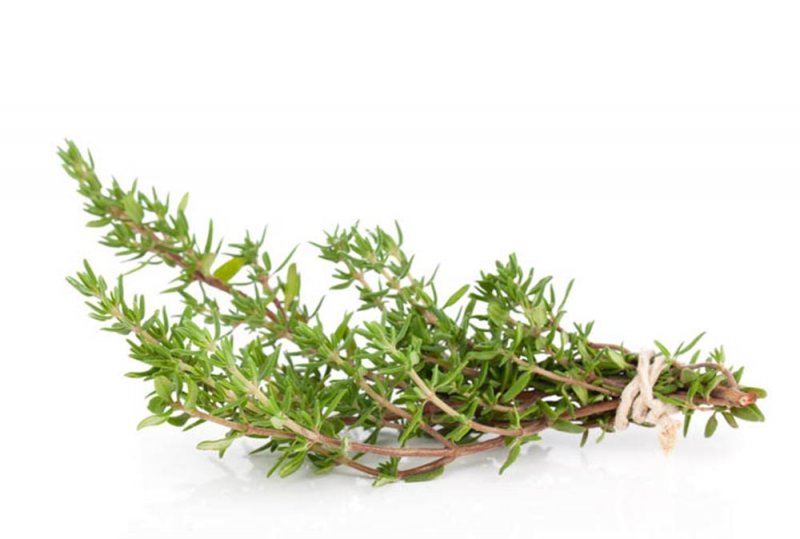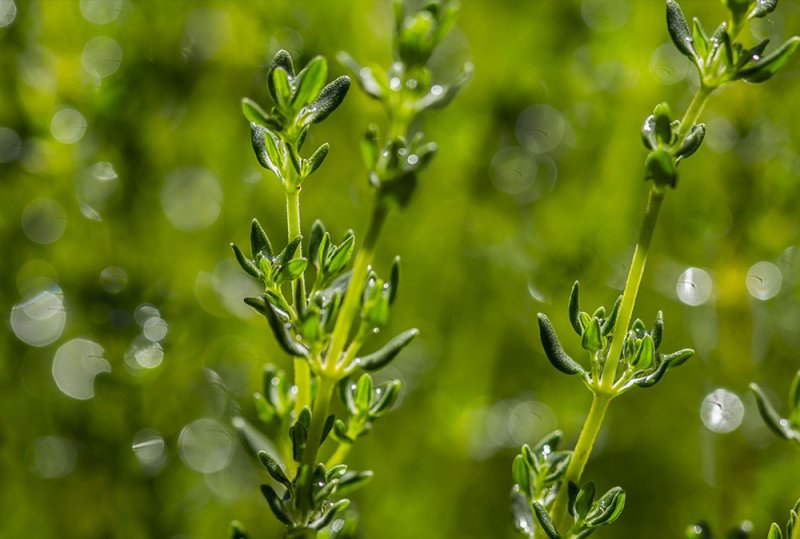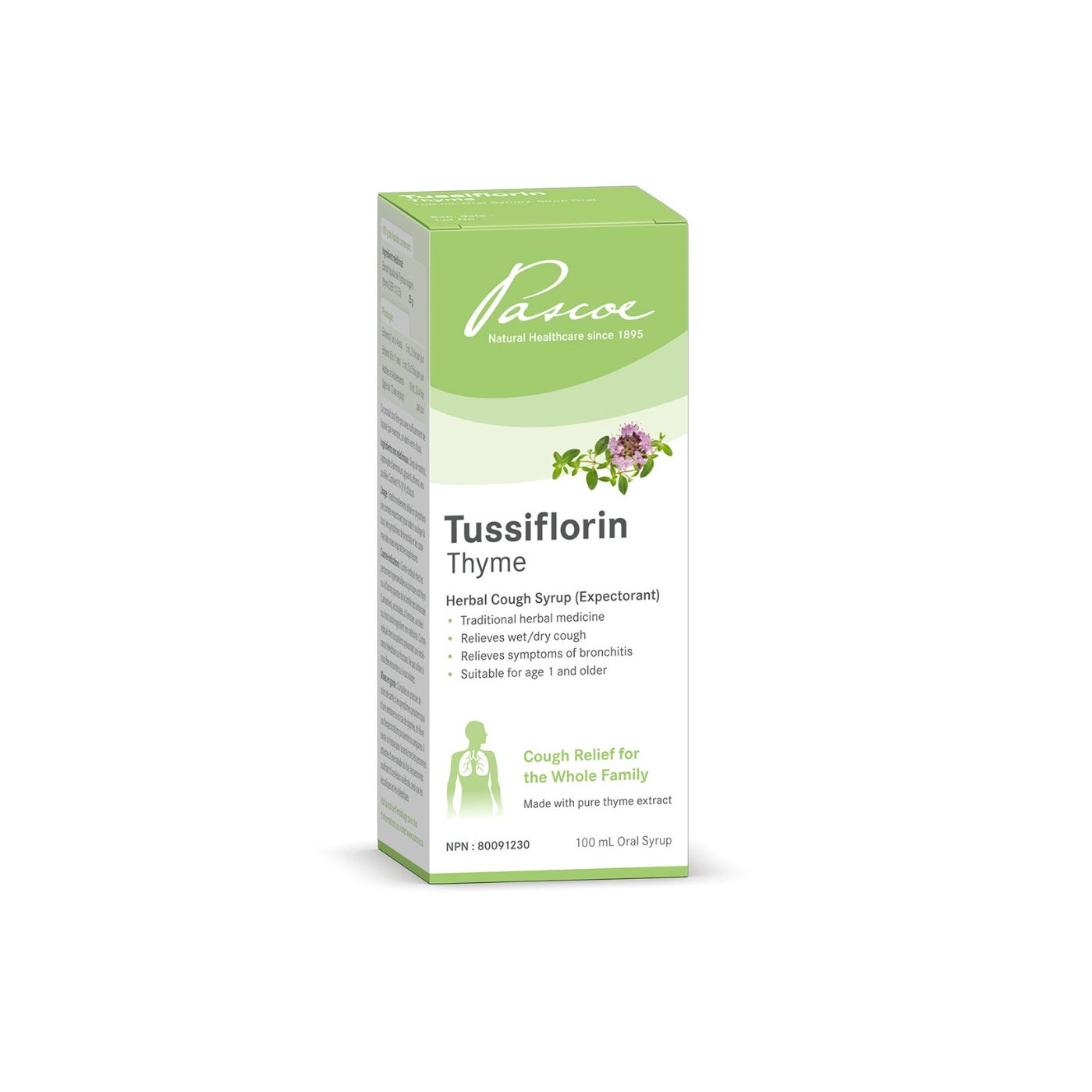

Thyme
Thyme (Thymus vulgaris) is a hardy aromatic shrub from the Mediterranean area. The evergreen herb has been used for centuries in cooking and herbal medicine.
Known for its antimicrobial activity, thyme was used in embalming mixtures back in ancient Egypt. Ancient Greeks put it in their baths and burnt dried thyme as incense. The herb was also historically used to help fight off infections and soothe coughs and sore throats.
The thyme plant was most likely brought to North America by European settlers. First grown in herb gardens, the low-growing perennial is now common throughout North America.
Thymus vulgaris is part of the classic herb mixture called bouquet garni. This fragrant bundle of herbs is added to casseroles, stocks, and soup. However, thyme does not only add flavor to cooking, but also offers many health benefits.
Thyme flowers, leaves, and thyme essential oil are used as herbal remedies. The most common use is probably for respiratory infections and coughs. Here, the herb has several modes of action.
Firstly, it acts against pathogens that can cause infections such as bronchitis. Secondly, it helps relax the respiratory system to subdue a spasmodic cough. And thirdly, it is an expectorant helping to break up phlegm so that it can be expelled.
For its antibacterial effects, thyme is a common ingredient in toothpaste, mouthwash, or deodorants. Thanks to its antiseptic and antifungal properties, it is also used as a food preservative.
Thyme extract can also be found in natural skincare. Due to its anti-inflammatory properties, thyme benefits particularly oily or acne-prone skin. The antioxidants in thyme can also condition the skin and protect it from signs of aging.
Origin and types
Thymus vulgaris or common thyme belongs to the mint family (Lamiacea). Originally from the Mediterranean area, this herb prefers full sun and well-drained soil. However, common thyme can survive in many different climates and is widely distributed.
There are many different species of Thymus, but Thymus vulgaris is used most often in cooking, herbal medicine, and as essential oil. The robust perennial is also known as English or French thyme, common or garden thyme, and conehead thyme.
Thymus x citriodorus is a popular culinary variety. It is also called lemon thyme for its strongly lemon scented leaves.
Thymus herba-barona or caraway thyme is another culinary variety. Its leaves have a strong scent of caraway and the herb has pretty rose-purple flowers.
Thymus serpyllum or wild thyme is mostly grown as an ornamental ground cover. It is a creeping thyme with fragrant mauve or pink flowers.
All culinary varieties are evergreen, meaning they are having green leaves throughout the entire year.
What does the plant look like?
T. vulgaris is a low-growing shrub with woody stems. Its aromatic leaves are small and grey-green. Thyme leaves can be used fresh or dried for cooking. In medicine, both the leaves and flowering herb tops are used.
The flowers are clusters of small white or lavender flowers that bloom between mid spring to mid summer. They are found on the tips of the stems and are well-liked by bees.
For peak flavor, it is best to harvest thyme just before flowering. However, the leaves can be picked all year round.
Each flower develops tiny seeds. Thyme growing is usually easy but growing it from seeds can be rather slow and difficult.


Where does the name come from?
The origin of the genus name Thymus is uncertain. Yet, many sources say that it comes from the Greek word ‘thumos’ which means smoke. This might refer to the use of the aromatic herb as incense in temples.
‘Thumos’ can also mean courage. This refers to times when the herb was seen and used as an emblem of bravery.
Some experts think that the Greek name comes from Old Egyptian ‘tham’, the name of a plant used in the embalming and mummification process.
Vulgaris is Latin and means common in the sense of widespread.
Thymus vulgaris as a medicinal plant
The medical herb is well-known for its antibacterial, spasmolytic, and expectorant effects. Therefore, Thymus vulgaris’ medicinal uses are traditionally for the upper respiratory system.
The leaves and flowers are the most important parts of the plant for herbal medicine. They are used to produce thyme liquid or fluid extracts, tea, and thyme essential oil.
Thyme contains the bioactive substances thymol and carvacrol. They are the main compounds of the herb’s essential oil. But these terpenoids are also found in other aromatic plants such as rosemary and oregano.
Research has shown that both compounds have many beneficial effects. Especially when combined, they show activity against a broad spectrum of pathogens such as certain bacteria, viruses, and fungi.
It has also been proven that thymol has spasmolytic activity. This means it can relieve smooth muscle spasms, such as coughing. For this reason, Thymus vulgaris is also used to improve digestion and to prevent menstrual cramps.
Both thymol and thyme essential oil have long been used to help clear and expel mucus from the lungs.
Some smaller clinical studies using thyme syrup in patients with productive cough complaints or bronchitis had very positive outcomes. One of the studies also showed the safe use of thyme syrup in children. However, more research and larger studies are needed.
Studies reported that thymol and carvacrol also have revealed antioxidant effects. By neutralizing harmful free radicals in the body, they prevent oxidative stress and preserve the integrity of the tissues.
In addition, both substances showed anti-inflammatory action by downregulating inflammation processes in the body.
Finally, the fresh herb is a rich source of vitamin C and A.
Medicinal properties of Thymus vulgaris
- Antimicrobial - antibacterial, antifungal, antiviral
- Spasmolytic - soothes coughs and relieves chest congestion
- Expectorant - helps to clear and expel mucus
- Antioxidant
- Anti-inflammatory
- Carminative - helps with indigestion, gas, colic
- Antiparasitic
Test tube and animal studies showed potential anti-cancer and anti-diabetic activities. Still, more clinical studies are needed.
How and what is it used for?
This herb can be used in many ways: fresh or dry, prepared in capsules or syrups, as tea, essential oil, or in dental and skin care products.
In the kitchen, T. vulgaris is a popular aromatic ingredient. Its essential oil can also be used as a food preservative.
In herbal medicine, thyme’s medicinal uses cover a range of conditions. Some of the main uses include the treatment of respiratory problems, inflammations and infections, as well as gastric issues.
Thyme essential oil is often used for aromatic and therapeutic purposes because of its strong antimicrobial activity. It is not only diffused into the air but also a common ingredient in mouthwash or natural deodorant.
Thymus vulgaris is also helpful for skin problems such as oily skin, acne, dermatitis,or eczema. Moreover, it is skin conditioning due to its potent antioxidants.
Health Canada approves the traditional use of Thymus vulgaris in herbal medicine
- as an expectorant to help relieve the symptoms of bronchitis and mucus buildup of the upper respiratory tract (anti-catarrh)
- to help relieve coughs (spasmolytic)
- to help relieve indigestion/flatulent dyspepsia and colic (carminative).
How does it work?
Research findings suggest that thymol and carvacrol are mainly responsible for the health benefits of thyme. Both are found in high concentrations in essential oils of aromatic plants. It is thought that they may be involved in the defense of the plants against insects, bacteria, fungi, and viruses.
Thymol and carvacrol have proven antibacterial effects. They seem to disrupt the cell walls and membranes of certain bacteria. This causes the cell contents to leak out and the bacteria die.
Both substances are phenolics and structurally similar. Due to their chemical structure, they have a strong antioxidant capacity. Studies found that they have an additive effect when combined.
In addition, studies confirmed the anti-inflammatory action of thymol and carvacrol. They downregulate inflammation promoting substances in the body. This enables them to suppress inflammations.
Taken together, thyme and its active substances are very likely to support the immune system.


What makes Thyme different?
Aside from adding aromatic flavor, thyme is linked to a wide range of health benefits. It can be used internally and externally, to support the body and skin.
Cautions and drug interactions
Thyme is generally well tolerated when taken by mouth in food amounts. It has Generally Recognized as Safe (GRAS) status in the US.
However, thyme side effects such as digestive upset, headache, or dizziness occur occasionally. Allergic reactions are rare, but possible in people with allergies to oregano or other plants of the mint family.
Thyme oil or supplements should be avoided during pregnancy and breast-feeding as there is not enough safety data available.
Like many other herbs, thyme might slow blood clotting. Taking large amounts of it along with anticoagulant or antiplatelet drugs might increase the risk of bruising or bleeding.
Thyme might act like estrogen in the body. Women with hormone-sensitive conditions or estrogen replacement therapy should use caution.
Unlike the fresh leaves, thyme essential oil cannot be ingested undiluted. Also, it cannot be applied directly to the skin.
Remember to discuss with your doctor before starting any new health product, especially if you are pregnant, breast-feeding or on medication.
Pascoe products that contain Thymus Vulgaris:
Disclaimer
Pascoe Canada does not offer health or medical advice as we are not a healthcare practitioner. Please speak with your healthcare practitioner before beginning any program related to nutrition, diet, exercise, fitness, medical, and/or wellness. All content published by Pascoe Canada is developed through collaborating with licensed medical professionals and contributors. This includes text, graphics, images, and other material on the website, newsletter, and products (“Content”). This content is for informational purposes only and does not constitute medical advice. The content does not substitute professional medical advice, diagnosis, or treatment. Please always do your own research on whether this is for you along with your healthcare practitioner advice. Always consult your healthcare practitioner prior to use specific herbs because you might have underlined conditions needs professional care. The content is general in nature and are subject to change. It is not intended to cover all possible uses, directions, precautions, warnings, drug interactions, allergic reactions, or adverse effects.


